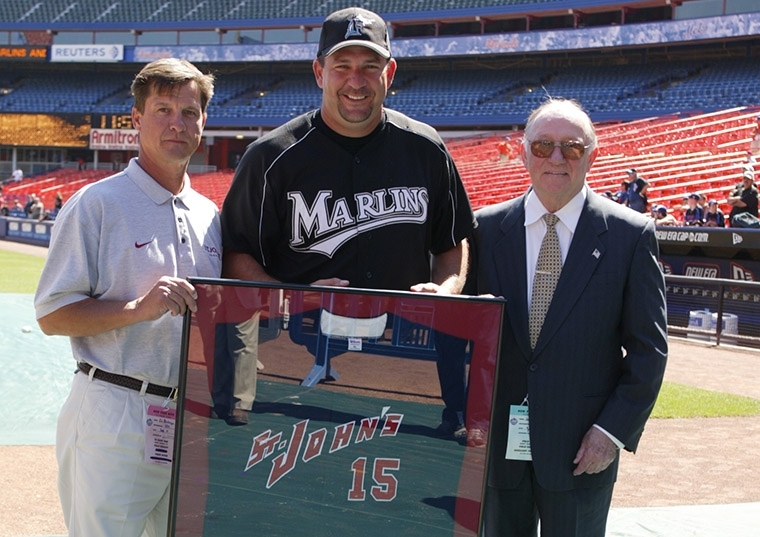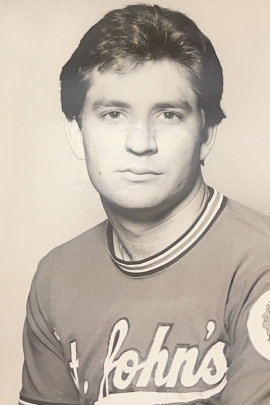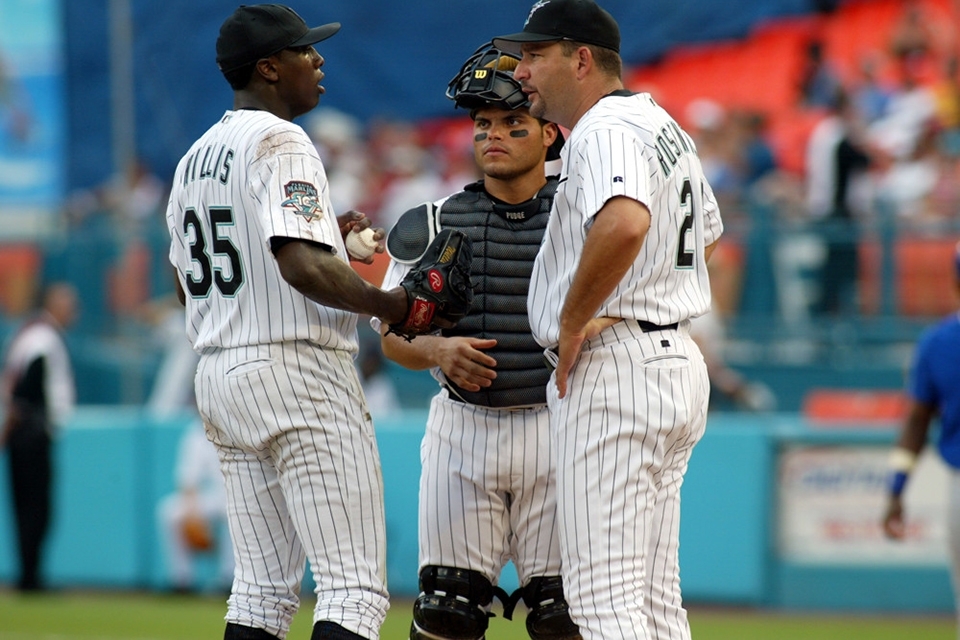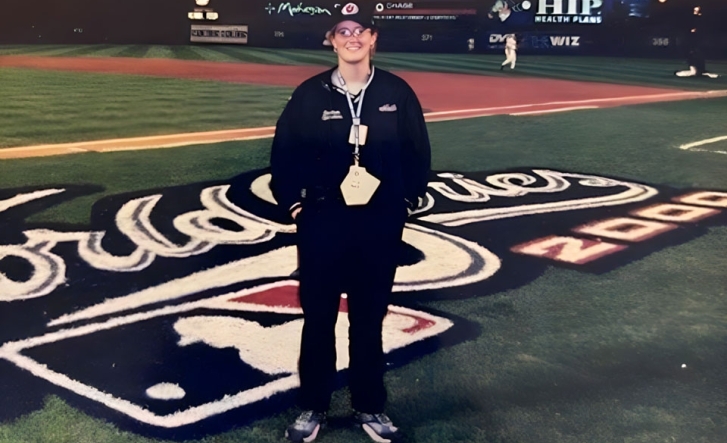Alumnus and World Series Champion Recalls Journey that Began at St. John’s University
As pitching coach for the Florida Marlins team that stunned the baseball world by ending the postseason dominance of the New York Yankees and winning the 2003 World Series, Wayne Rosenthal ’87SVC has participated in something about which every Little Leaguer dreams. However, what’s most important to this former St. John’s University standout pitcher is his role as husband and father, and his devout Christian faith.

“I grew immensely at St. John’s,” he stressed. “It helped me grow, push myself harder, and finish my degree—and think about life after baseball.”
A native of Brooklyn, NY, Mr. Rosenthal came from a family of intense baseball fans. “My mom used to have two televisions in one room—one was on the Yankees game, and one was on the New York Mets game. She loved watching baseball and watching my brother and I play when we were younger.” Around age 12, his skills increased dramatically, and he began playing for a travel team.
While he would ultimately find his way to the major leagues as a pitcher, as a young teenager Mr. Rosenthal played several positions, primarily at catcher. He modeled himself after his idol, the late Thurman Munson, the gritty Yankee captain who tragically lost his life in a 1979 plane crash. “I loved watching him play and started rooting for the Yankees,” he recalled.
“I was always a pitcher,” he noted, “but I was never the main pitcher.” One summer, Mr. Rosenthal caught more than 50 innings of play. “I loved being a catcher but got a little too big.” He was primarily a shortstop and a fifth or sixth starting pitcher in high school.
At South Shore High School in Brooklyn (which has since closed), he eventually became their number one pitcher. In his sophomore and junior year, he pitched in the high school championships at Shea Stadium and Yankee Stadium, respectively. “What a thrill for a high school kid,” he recalled.
During a summer league all-star game, the late Head Coach Joe Russo offered Mr. Rosenthal a scholarship to St. John’s. An all-around player, Mr. Rosenthal had other offers, but knew if he attended St. John’s he would only pitch. After a prophetic conversation with his father, he decided his path to success lay at St. John’s.
“I knew that working under (pitching coach) Howie Gershberg, I could master pitching instead of trying to master three of four different positions,” he said. “It was the best decision I could have made.”
Many St. John’s Baseball alumni, including John Franco and Frank Viola, pointed to Coach Gershberg as a kindhearted mentor who was primarily responsible for their success—and Mr. Rosenthal is no exception. “He changed my life,” Mr. Rosenthal said. “He was a mentor, a teacher, and a friend. He was a great human being who cared about what he was doing and the people with whom he worked.”
Mr. Rosenthal credited Coach Gershberg with teaching him the slider: a pitch, he stressed, that was instrumental in his college success, eventually leading to his being drafted to the majors. “I owe him my career as a player and somewhat as a coach because I use what Howie taught me today. He talked to me as a human being, not just an athlete. He’s the number one reason I am successful today.”
Mr. Rosenthal was an All-BIG EAST selection at St. John’s, helping the baseball team to the BIG EAST Conference Championships in 1985 and 1986, and the National Collegiate Athletic Association Division I Northeast Regional Baseball tournament in 1985, and the finals in 1986.
A right-handed pitcher who threw in the mid to high 80s, Mr. Rosenthal never assumed a major league club would draft him. “That made me an average pitcher.” However, after a particularly solid St. John’s performance, a scout for the Texas Rangers submitted his name for the draft. “He said, ‘This guy will compete and throw strikes.” The Rangers drafted Mr. Rosenthal in the 24th round in 1986.
After being drafted, Mr. Rosenthal returned to St. John’s and completed his bachelor’s degree in Athletic Administration (which evolved into the Sport Management major) in 1987. “I grew immensely at St. John’s,” he stressed. “It helped me grow, push myself harder, and finish my degree—and think about life after baseball.”
In Rookie Ball (the minor league preceding Single A), Mr. Rosenthal was one of 17 pitchers and bluntly informed he was ranked 17th. From that moment forward, he was determined to overcome whatever odds were stacked against him. He threw three shutout innings in his first game, and worked his way up to closer.
Mr. Rosenthal was Minor League Pitcher of the Year in 1987 but was hurt the following season. Each season, despite whatever success he achieved, there was always the possibility of being released. “They waited for me to fail, and I took it as a challenge.” In 1990 he was promoted to Triple A, and he made the big club in midseason the following year.
Mr. Rosenthal’s first major league appearance came in the eighth inning of a game against the Oakland Athletics on June 26, 1991. He walked Jose Canseco on four pitches, but struck out Hall of Famer Harold Baines, which put him at ease. The following day he was brought in with the bases loaded and induced the hitter into a double play, which got his team out of the inning and got him his first major league win.
Pitching steadily throughout the 1991 season, Mr. Rosenthal had high praise for pitching coach Tom House. “He’s one of the smartest individuals I ever met. He made time to work with all the younger guys, and I respected that.” Late in the season, Mr. Rosenthal expected to be sent back to the minors when Hall of Fame pitcher Rich “Goose” Gossage returned from injury. “I was low man in the totem pole, but I had just pitched 14 1/3 innings in seven days to help the bullpen out, and Tom said, ‘We’re keeping you up because you just gave your arm for the team.’”
Despite a solid performance that year, Mr. Rosenthal was not guaranteed a spot on the roster in 1992 but made the team in Spring Training. “The one thing I tell my players today is that it’s hard to get [to the majors], but it’s even harder to stay there. I came to Spring Training in the best shape of my life and I made the team. Then I stopped working. Three weeks later, I was back in the minors and never made it back. I became complacent and deserved to get sent down. It happens that quick.”
Despite the disappointment, Mr. Rosenthal believes God had a plan for him. He played another year in independent baseball, hurt his arm, and had career-ending surgery. In short order, he was offered a position as pitching coach for the Johnstown Steal of the Frontier League. He coached for two other independent teams and won three championships in three years before the major leagues beckoned again.
Coaching, he believes, is his true calling. “It’s a great feeling being able to teach and help out. Maybe God took me out of my playing career at age 28 to do this.” In an ironic twist of fate, Mr. Rosenthal coached against old friend and mentor, Coach Gershberg (now working for the Anaheim Angels), in Double A ball. “We sat there reminiscing, and it was great to see him.”
In 1997 the Montreal Expos (now the Washington Nationals) hired Mr. Rosenthal as their Rookie Ball Pitching Coach, and he quickly ascended to Minor League Pitching Coordinator in 2001. The following year he assumed the same position for the Marlins. In 2003, he was shocked to be named their Pitching Coach, which entailed a prophetic turn of events.
Mr. Rosenthal began the 2003 season in his role as coordinator. Asked to accompany future National League Rookie of the Year Dontrelle Willis to his first major league assignment because they had worked closely together, he found himself in a temporary assignment as bullpen coach. During that series, the Marlins fired their manager and pitching coach, and offered Mr. Rosenthal the job on the spot.
“I had to call my dad to pick clothes up at my house because we were immediately leaving for a 14-day road trip, and I didn’t have anything,” he laughed.
“I was overwhelmed. I was 38 years old with a staff of young, headstrong pitchers,” including Willis, Josh Beckett, Braden Looper, and Carl Pavano. His style was different from the previous coach, but he eventually won over his charges. “I had a great experience that season.”
Being a New Yorker and a Yankees fan, Mr. Rosenthal couldn’t help but appreciate the irony of dethroning the team he watched as a boy. “We just had a great bunch of guys who blended well together. Nobody gave us a chance, but we just peaked at the right time. It was such an amazing run.”
Mr. Rosenthal kept his job throughout the 2004 season, but the team faltered, and he returned to his prior role in 2005—a post he held for the next 10 years with a brief stint as Rehab Coordinator.
Mr. Rosenthal feels that working with young pitchers is his greatest strength. One young man who greatly impacted him was the late José Fernández, a two-time All-Star and 2013 National League Rookie of the Year. “He was an unbelievably talented young man with a heart of gold.”
Mr. Fernández formed a special bond with Mr. Rosenthal, whose wisdom he trusted implicitly and who he called Papa. “He came to my 50th birthday party,” Mr. Rosenthal said. “He came to my son’s baseball games, hung out in the dugout, and took pictures with all the kids.”
Mr. Rosenthal’s son became a catcher, and when Mr. Fernández learned of the new position, he purchased top-of-the-line equipment from Under Armour for him. “He came from nothing, and that’s the type of heart he had.”
While he loved his job, Mr. Rosenthal traveled around the country often. He met and married his wife Tammy in 2005 and his son Braden was born in 2006. During the off season he was a full-time father—a job he relishes. A new regime came in and Mr. Rosenthal lost his job in 2016. “Looking back, it was the best thing that ever happened to me. I got to stay home. After my last interview, Braden said, ‘Dad, I guess you must spend more time with me.’ That hit me hard.”
Another benchmark moment for Mr. Rosenthal came when he became a Christian. His wife encouraged his conversion for several years, but he was not yet ready. After his son was baptized, he told his father he wanted him to be next. “I found my identity through Christ,” he stressed.
Mr. Rosenthal got a coaching job at a local school his son would eventually attend and got to spend every day with him. “It was a blessing,” he said, and he turned down three minor league offers to stay there. Later, he was hired as Head Baseball Coach at Calvary Christian Academy in Fort Lauderdale, FL, another school his son would attend. “Now I’m teaching my son again,” he said. “I see him in the classroom and on the baseball field. This is a really precious time.”
There, he combines his love for the game, deep faith, and a desire to produce quality young men who will grow up to be great sons, husbands, and fathers—not just great athletes. As a coach, he shares his life experiences with others, hoping to make a difference. Despite a career filled with ups and downs, this self-professed “nice Jewish boy from Brooklyn” sees it all through an intensely positive lens. “God definitely had a plan for me.”





